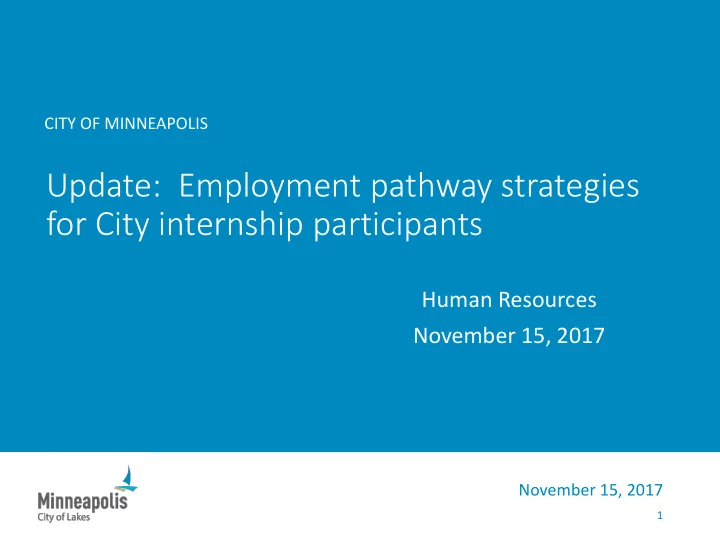

CITY OF MINNEAPOLIS Update: Employment pathway strategies for City internship participants Human Resources November 15, 2017 November 15, 2017 1
Agenda 1. Current state: Pathways and internship programs 2. Barriers in hiring 3. Potential strategies to increase recruitment, retention, and development of interns 4. Next steps 2
July 29, 2017 Staff Directive Directing staff to evaluate strategies that may provide pathways to employment for participants in Step-Up, Urban Scholars, and the City’s other internship programs in conjunction with other strategic workforce planning initiatives intended to broaden recruitment, development, and retention programs. 3
Internship Philosophies The primary purpose of general City-sponsored internship programs is to: • Expose young people to the world of work • Apply their educational knowledge in a work setting • Satisfy graduation requirements of a degree program • Develop leadership qualities • Provide networking opportunities to build social capital 4
Defining the Current State Career Exploration Internships Pathways Programs Purpose Unpaid career exploration and Provide exposure to the world of work, Training program leadership development of specifically work at the City, and/or to designed to gain the youth designed to spark in apply educational knowledge on the job in skills necessary to be interest in a particular field their field of study. hired into entry-level City (public safety). positions. Both City- sponsored and City- partnered programs. Programs Step-Up (ages 14-21), Fire and Urban Scholars, EMS Academy, Community CSO, Police Cadet, Fire Police Explorers, Police Service Officer intern, various job-specific Cadet, PWSW Trainee, Reserves, EMS Pathways High department internships and fellowships 911 Telecommunications, School Program Public Sector Administration, Auto Mechanic, MSP TechHire Employment Not a direct path Some are broad and not a direct path, Direct hire to permanent Expectations others are specific to field of interest that position lead to participation in Pathways Programs 5
Placement Rates Step Up Job-specific Urban Scholars Urban internships Undergraduate Scholars Graduate # interns hired 436 932 99 15 # returning interns 78 276 36 2 # hired into permanent 5 89 3 6 position # retained 3 25 2 4 Bottom Line Results 18% re-intern 30% re-intern 36% re-intern 13% re-intern 1% hired 10% hired 3% hired 40% hired Step Up = data includes 2006-2017 Urban Scholars Undergraduate = data includes 2012-2017 Urban Scholars Graduate = data includes 2013-2017 6
Barriers • Civil Service merit-based, competitive hiring system • Most City positions require job-related work experience and graduating interns do not meet qualifications • Interns do not qualify to apply for positions restricted to City employees • Lack of centralized focus to keep interns engaged with the City as an employer • Timing of recruiting for relevant vacant positions to graduations 7
Employment: Strategies In Progress • Partnering with 4 other local government agencies to develop a Public Sector Institute for internships/youth workers • Partnering with Hennepin County to design equivalencies for work experience • Partnering with Step-Up and Urban Scholars to explore public-sector specific participants 8
Employment: Potential Strategies • Formalize an intern succession model: Step Up > Urban Scholar > Pathways Program • Engage Hiring & Promotion LMC to create a “City Academy” trainee program with hiring preference into professional-level positions • Explore aligning internship programs in a centralized area • Expand and capitalize on graduates through the use of Bell Curve staffing • Benchmark intern program hires at other government agencies • Set a City goal for retention, accounting for financial investment 9
Employment: Potential Strategies • Partner with Hennepin County to create a robust Speaker’s Bureau in area high schools and technical colleges. • Explore job rotation in multiple City departments 10
Retention: Potential Strategies • Define desired outcomes for retention and measures of success • Keep them engaged as a cohort for 3 years with specific development opportunities and networking events • Provide mentors for the first year of permanent employment 11
Next Steps • Research on other local intern programs to identify best practices and benchmark data • Partner with Step Up and Urban Scholars programs to identify needs and barriers and prioritize short- term and longer-term priorities • Identify goals and metrics for hiring and retention 12
Recommend
More recommend